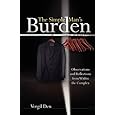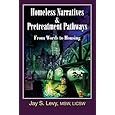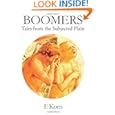
“The Simple Man’s Burden”
Author: Vergil Den
I’ve spent the last three days toiling…trying to figure out how to write a good review for “The Simple Man’s Burden” by author Vergil Den. Unfortunately I was stumped then and I’m still stumped now.
Where do I begin? Well, the cover was unusual. The book’s title “The Simple Man’s Burden” was underlined however when I looked closer I saw that the “underline” was actually a metal closet rod from which a pressed man’s suit and eleven empty hangers hung. Below that were the words “Observations and Reflections from Within the Complex.” Mm hmm… Interesting… I wondered if I was going to open the book and find myself reading about some Communist compound that everyone who was unfortunate enough to be stuck inside was trying to escape. Maybe that feeling was the author’s intent; if so, then kudos to him. I flipped the book over and read the back. The author’s comment that “he is a recovering Empty Suit” threw me for a loop but at least the jacket’s artwork made perfect sense now.
In “The Simple Man’s Burden” the author wants us to follow along and experience a day in the life of a quietly desperate company man. This unhappy man, who is a management consultant, shares with us his dark and cynical thoughts about this absurd and unpredictable day. Did I mention that these thoughts are supposed to be humorous? According to the jacket they are supposed to be “bizarrely humorous” and have been compared to “Bloom County,” “Office Space,” and “Monty Python.” While I haven’t seen “Bloom County” I have watched “Monty Python” and “Office Space.” While I may not have laughed at everything they contained I did laugh at some. That’s more that I can say for this book which elicited from me a total of one half-hearted snicker during its entirety.
Sadly, I found “The Simple Man’s Burden” a “burden” to read. The author, Vergil Den, seems intent on writing in a very pompous and garrulous manner. He has a plethora of gratuitously polysyllabic words of which ubiquitous seems to be one of his favorites. He drones on and on about the wrongs of almost everything and it seems as if nothing is safe from his overly critical opinion even though more often than not he presents it as fact. A tiny example: his bold assertion that all ESs (Empty Suits) are golfers. Has he met every single “ES” in the world? Maybe a better statement would be that he’s sure all ESs are golfers…not that they are. And honestly does it really matter if they are or aren’t? And just out of curiosity…isn’t labeling a form of discrimination?
I could continue indefinitely with my criticism but I won’t. Suffice it to say that I neither enjoyed nor agreed with the message in “The Simple Man’s Burden.” And lastly, I found the author’s voice to be exceptionally critical, disdainful, condescending, and mean-spirited toward mankind in general.



